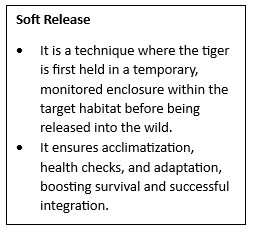Syllabus:
GS-3: Conservation, environmental pollution and degradation, environmental impact assessment
Context:
The Environment Ministry has cleared the capture of eight tigers from Tadoba-Andhari and Pench reserves for their translocation to Maharashtra’s Sahyadri Tiger Reserve.
About the Translocation

- This is aimed at reviving the big cat’s population in the northern Western Ghats by translocating three male tigers and five female tigers.
- National Tiger Conservation Authority (NTCA) cleared the translocation plan in October 2023.
- The Wildlife Division has permitted Maharashtra to capture tigers under conditions of ensuring veterinary care throughout capture and translocation, prevention of post-capture complications, and minimal trauma to the animals during operation.
- The translocated tigers will first be put in a temporary enclosure, known as a soft release, before being released into the wild.
- Translocation of tigers in India is primarily governed by the Wildlife (Protection) Act, 1972, specifically Section 12, which allows for the capture and relocation of specific animals under certain conditions.
- It requires prior approval for the translocation of wild animals by the Central Government for Schedule I species and by the State Government for others.
- Reviving tigers in Sahyadri is vital for forest and watershed protection, and to link northern Western Ghats with tiger habitats in Goa and Karnataka.
Sahyadri Tiger Reserve (STR)
- STR is situated in the state of Maharashtra which takes its name from Western Ghat’s Sahyadri Range and it is the only tiger reserve in western Maharastra.
- STR was established in 2010, by combining the Koyna Wildlife Sanctuary and the Chandoli National Park. .
- It spans across Kolhapur, Satara, Sangli, and Ratnagiri districts in western Maharashtra.
- It also contains the reservoirs “Shivsagar” of the Koyana River and “Vasant Sagar” of the Warana River.
National Tiger Conservation Authority (NTCA)
- NTCA is a statutory body under the Ministry of Environment, Forest and Climate Change constituted under enabling provisions of the Wildlife (Protection) Act, 1972, as amended in 2006, for strengthening tiger conservation.
- NTCA strengthens tiger conservation through advisories, guidelines, and expert committee recommendations.
- The authority is chaired by the Union Environment Minister.
- The objectives of NTCA are:
o Providing statutory authority to Project Tiger so that compliance of its directives becomes legal.
o Fostering accountability of Centre and State in management of Tiger Reserves, by providing a basis for MoU with States within our federal structure.
o Providing for an oversight by Parliament.
o Addressing livelihood interests of local people in areas surrounding Tiger Reserves.
Sources:
Indian Express
Tadoba Park

